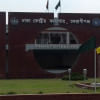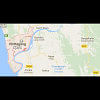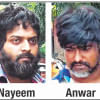Inmates exposed to radicalisation
Parents should always keep an eye on their children, discuss various issues in their lives and encourage them to engage in cultural activities, family members of a number of militants came up with these suggestions yesterday.
Speaking at a workshop, they also suggested that the government should take effective counter-narrative initiatives, visible de-radicalisation programmes in and outside the prisons and rehabilitate those who have already been de-radicalised.
Family members and relatives of 14 militants, including some of the Gulshan Café attackers and others who were on bail, and two de-radicalised people who are being rehabilitated, attended the workshop titled Radicalisation and Extremism Prevention: Role of Families and Societies". It was organised by the Counter Terrorism and Transnational Crime unit at its office in the capital.
Many of them cried while describing how their near and dear ones got radicalised and killed in police raids or were in jail. This paper is withholding their names upon their requests.
“For 10 years, I played [football] with my son so that he doesn't get spoiled ... But they took him away from me," said the father of one of the Gulshan attackers who killed 22 people, mostly foreigners, on July 1, 2016.
“Had I got any indication, I would have taken him to a safer place," he said and broke down in tears.
The participants of the programme, first of its kind, urged the authorities concerned to immediately launch de-radicalisation programmes in jails. They said the current accommodation system in the prison gives radicals the opportunity to spread their sick ideology.
“Keeping them [militants] in one building in jail, the authorities are thinking that they cannot mix with others and radicalise people. But they [the militants] are able to discuss radical ideas among themselves and it is not changing their mentality," said a former top militant recruiter, who is now on bail after staying in jail for over a year.
The man, who realised his mistake and currently is helping law enforcers, said, “It is an ideological conflict and we have to fight it ideologically with all our efforts.”
He said militants were sparking anger in talented and pious people to recruit them.
He emphasised on strong coordination among law enforcers and intelligence agencies to root out militancy.
A brother of Jebunnahar Shila, wife of “Neo JMB” leader Major (retd) Jahidul Islam, who was killed in a raid in Mirpur, urged the authorities concerned to keep those with terror charges separate from each other in jails.
“When my father and I visited her in the jail, we came to know that she [Shila] realised her mistake. However, there are some radicals there who can misguide her once again," he said.
A mother of a suspected militant who has recently been released on bail said the prisons seem to be a dangerous place.
Many people, who got arrested at the initial stages of their radicalisation, became more radicalised while in jail, she said, quoting her son.
The woman urged the country's Alem Ulema to speak against the distorted explanation of the holy Quran that the militants use to radicalise innocent youths.
Mother of the café attacker alleged that they had informed a law enforcement agency about her son going missing but "the matter was not taken seriously". She demanded introduction of a separate cell for lodging complaint over missing youths. She said all law enforcement agencies could take information from the cell for taking prompt action.
Some of the parents said while being radicalised, their sons turned absent minded, frustrated, reluctant to study, and used to react to violence against Muslims around the world.
Father of another militant, who was arrested in Comilla and is now in jail, said the rehabilitation programmes for the radicals should be visible for encouraging others to return to the right path.
Visible rehabilitation is necessary as when youths realise their mistake and intend to surrender, their leaders discourage them by saying the law enforcers will kill them, he said.
Several participants urged the law enforcers to show sympathy towards the radicals who return to normalcy and agree to help police find other militants.
About the programme, Monirul Islam, chief of CTTC, said they started the initiative as it was not possible to solve the problem only through raids.

 For all latest news, follow The Daily Star's Google News channel.
For all latest news, follow The Daily Star's Google News channel. 








Comments